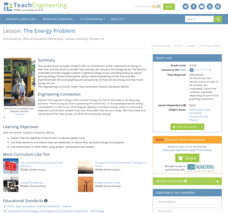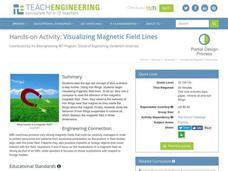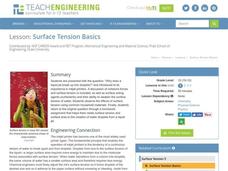Teach Engineering
Energy Forms, States and Conversions
Even magicians can't make energy disappear. In a discussion-based lesson plan, young scientists learn about energy forms and conversions. They see how energy is neither created nor destroyed; it just changes forms. This is the 11th...
Teach Engineering
The Energy Problem
Think you can solve the energy problem? You'll first need to know about current energy use. Analyzing a set of circle graphs lets scholars see where energy consumption is the greatest, both by sector and by household use. They develop a...
Teach Engineering
Circuits
Don't know how to make the initial connection on electric circuits? This lesson provides the background to present the introductory vocabulary to learning about electric circuits. It is organized in a meaningful progression with an...
Teach Engineering
Organic Solar Energy and Berries
You can eat a solar cell? A unit on solar energy begins with a discussion about organic solar cells, followed by directions on how to build your own. After following the teacher's directions to build an anthocyanin dye-sensitized solar...
Teach Engineering
The Fibonacci Sequence and Robots
What better way to introduce the idea of a sequence than with robots! An educational lesson explains the classic Fibonacci sequence before pupils build and program a robot to move. Additionally, the lesson challenges individuals to...
US Environmental Protection Agency
Weather and Climate: What's the Difference?
Future weather forecasters collect daily temperatures over a period of time. Afterward, they compare their data with monthly averages, as researched on national weather websites, in order to grasp the difference between weather and...
US Environmental Protection Agency
A Mock Town Meeting on a Proposed Tank Farm
Intended as a follow up to the Protecting Your Drinking Water activity, young environmentalists use their assessment of the a hypothetical town's water supply to debate the installation of underground chemical storage tanks. With the...
Rain Bird Corporation
Rain Forest Teaching Curriculum
Take young naturalists on an exploration of the world's tropical rainforests with this extensive collection of lessons and activities. Whether its creating leaf and flower prints or investigating the absorption spectrum of chlorophyl,...
Curated OER
Fracking: Positive or Negative Impact?
Your teenagers may have heard of fracking, but do they really know what it is? And could they debate the benefits and risks? Educate your environmental science class with a lesson about hydraulic fracturing, non-renewable energy sources,...
NASA
NASA Engineering Design Challenges - Spacecraft Structures
What kind of design challenges are there in building structures to support rocket engines? The unit takes design teams through the process of building the lightest possible thrust support structure that can withstand the necessary forces...
Teach Engineering
Bouncing Balls
How high will it bounce? Groups determine the height different balls bounce off of different surfaces. By performing the necessary calculations, they determine the initial and final momentum of the balls. The included worksheet provides...
Teach Engineering
Curb the Epidemic!
Class members use an applet on the Internet to simulate the spread of a disease. The simulation allows individuals to determine two nodes to vaccinate to limit the number of nodes infected. By running several simulations, scholars can...
Teach Engineering
The Grand Challenge
Magnetic resonance imaging, just how safe is it? The introduction to unit study of magnetic resonance imaging technology presents the grand challenge questions of how an MRI machine works, the risks involved, the physics involved, and...
Teach Engineering
Visualizing Magnetic Field Lines
Magnetic fields might not be a field of dreams but they are useful. Class members observe the reactions of magnetic fields using a compass, iron filings in a paper container, and iron filings suspended in mineral oil.
Teach Engineering
Viscous Fluids
Elasticity and viscosity. Help your class understand the similarities and differences with an introduction to viscous fluids. After describing four types of fluid behaviors: shear thinning, shear thickening, Bringham plastic, and...
Teach Engineering
How Antibiotics Work
Take two pills and call me in the morning. The first lesson plan in a short unit of four introduces class members to delivery methods of medicines. The instruction introduces the question of which delivery method is best to get you...
Teach Engineering
Pill Dissolving Demo
Plop, plop, fizz, fizz, oh that one is the fastest. The teacher demonstration is the second part of a four-part series. The class observes how different pill types dissolve in simulated stomach acid. They determine which one dissolves...
Teach Engineering
Surface Tension Lab
What constitutes a good soap bubble? In the second installment of a nine-part series, scholars apply their understanding of surface tension to soap bubbles. They experiment to determine the best solutions to use for the...
Teach Engineering
Skeletal System Overview
It is best to know all about the skeletons in the closet. The third segment in a five-part series focuses on bone structure, development and growth, and functions. Class members connect what they learn to their study of osteoporosis.
Teach Engineering
Cell Membrane Experimental Design
Grandma said to gargle with salt water for a sore throat. Was she right? In the last part of the seven-part unit, lab groups design an experiment to test a cells reaction to salt solutions. The pupils conduct their experiment to answer...
Teach Engineering
The Keepers of the Gate Challenge
Help your class make a connection between salt water and nanoscience. In the introductory lesson of a seven-part unit, the class explores why salt water helps a sore throat feel better. Pupils conduct preliminary research about the...
Teach Engineering
Surface Tension Basics
Back to the basics (of surface tension). The first installment of a nine-part series teaches young scholars about the basics of surface tension and how it relates to water droplets. They also learn how this concept allows for the...
Teach Engineering
Cell Membrane Structure and Function
Teach your class how to get out of a cell — or break in. The third installment in a seven-part series introduces the class to cell membranes and their functions. The lesson plan includes information to present to the class,...
Teach Engineering
Air Pollution in the Pacific Northwest
Scholars investigate levels of nitrogen dioxide in the Pacific Northwest by examining the role of nitrogen in air pollution and how remote sensing can be used to measure nitrogen levels. An Excel spreadsheet calculates the difference...
Other popular searches
- Multinational Corporations
- Corporations Supreme Court
- Close Corporations
- Corporations Stock
- American Corporations
- Accounting in Corporations
- Human Body Corporation
- Nonprofit Corporations
- Culture and Corporations
- Corporations and the Courts
- Corporation Research
- Economics, Corporation

























